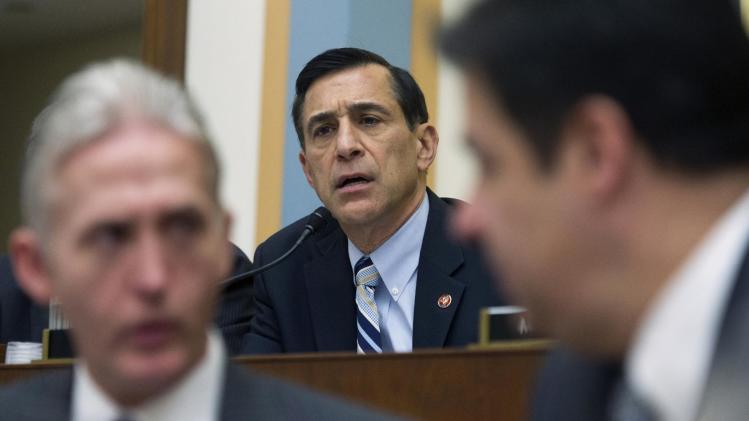
WASHINGTON (AP) — A top
U.S. military intelligence official said Tuesday that the Pentagon will
have to make costly changes to programs and personnel because of leaks
by former National Security Agency analyst Edward Snowden.
Defense
Intelligence Agency chief Lt. Gen. Michael Flynn told the House
Intelligence Committee that his agency has to assume that Snowden took
every document he accessed, and that much of it concerned Pentagon
programs.
"We assume the worst
case in how we are reviewing all of the Defense Department's actions...
events, exercises around the world," said Flynn, whose agency produced a
classified report assessing the fallout of the Snowden leaks. He said
he believes there will likely have to be changes in all branches of the
U.S. military because investigators have to assume the information is
compromised.
"What he
potentially made off with ... transcends" the NSA's telephone and
Internet collection programs, said Director of National Intelligence
James Clapper, speaking before the committee's annual threat assessment
hearing. "Less than 10 percent has to do with domestic surveillance
programs," he said.
Clapper has called on Snowden and anyone who is helping him to return the remaining documents that have not yet been published.Documents released over the past year by Snowden have revealed that the NSA sweeps up millions of Americans' phone and Internet records. Revelations about the NSA's spy programs were first published in the Guardian and The Washington Post newspapers in June, based on some of the thousands of documents Snowden handed over to Barton Gellman of the Post, Brazil-based American journalist Glenn Greenwald and Laura Poitras, a U.S. filmmaker.
The subsequent controversy has led President Barack Obama to ask agencies and Congress to consider some reforms.
Officials have said Snowden downloaded some 1.7 million documents. U.S. intelligence officials have said some of those documents include the identities of undercover operatives. The officials spoke on condition of anonymity because they were not authorized to speak publicly about the case.
In describing the effect of
Snowden's leaks, Clapper appeared to carefully retreat from his
contention last week to the Senate Intelligence Committee that the
disclosures were "the most massive and most damaging theft of
intelligence information in our history." Some historians and
researchers reacted to that comment by questioning whether the Snowden
leaks were more damaging than Soviet spy rings that stole U.S. atomic
bomb designs in the 1940s and funneled critical communications data and
lethally exposed American informants in Russia in the 1980s and 1990s.
Instead,
in his opening statement Tuesday, Clapper told the House panel that
Snowden's leaks were "potentially the most massive and most damaging
theft of intelligence information in our history."
House
Intelligence Chairman Mike Rogers said the information Snowden accessed
includes countermeasures the U.S. military uses to avoid the
devastating improvised explosive devices used against troops in
Afghanistan, and increasingly beyond traditional war zones, aimed at
U.S. and Western officials in places like Libya.
He
also tried to draw out Clapper and Flynn on whether they believed
Snowden was somehow working with or being exploited by the Russian
intelligence services.
When
Flynn said "I don't have any information to that effect," that drew a
sharp "Excuse me?" from Rogers, who had discussed the same subject with
the two officials in a classified session the day before.
Flynn rephrased his reply, saying, "Yes, there is a possibility that he is under that influence."
Clapper
said there was no proof, but added that, "it's beyond belief to me that
they wouldn't be taking advantage of the ... opportunity both to
exploit and to control Snowden."
After
the hearing, Rogers said, "I can tell you from a whole series of
classified meetings, the folks who do this for a living believe he is
under the influence of the Russians." He also said he believes that if
Snowden carried any of the material with him or accesses it in any way,
the Russians will crack the code and breach the information — an opinion
echoed by senior House Intelligence Committee Democrat Adam Schiff of
California.
"Snowden has to
know that if he took that classified information into Russia, there has
to be a good chance the Russians will get hold of it," Schiff said in an
interview after the hearing.
Snowden
told The New York Times that he left all of the documents with
journalists in Hong Kong before traveling to Russia, where he has
temporary asylum.
Snowden has
denied working with the Russian government or any foreign intelligence
agency. Snowden's legal representatives could not be reached for
immediate comment.
Rogers,
R-Mich., also said an individual with access to the Snowden documents
was attempting to sell them for personal profit, but he would not
identify who that was. He asked FBI Director James Comey, also at the
hearing, whether such a person could be prosecuted for selling stolen
goods, but Comey demurred, saying if the individual in question was a
journalist he or she might be protected by the Constitution's rights to
free speech.

No comments:
Post a Comment